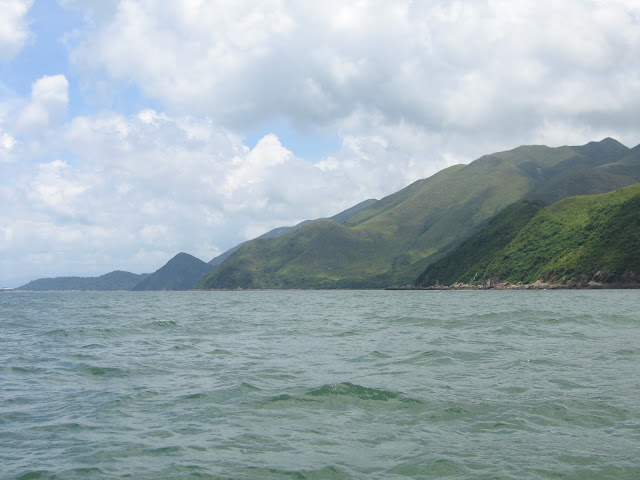When we talk about Hong Kong, the
first thing that comes to mind is their tourism board’s memorable televised
advertisement made many years ago. It marketed Hong Kong to us so well that we
remembered it ever since. Hong Kong is about shop, eat, shop, eat and then shop
and eat some more (买东西,吃东西). We certainly enjoyed Hong Kong for
its shopping and eating. If you have only a few days, exploration is usually
limited to the city area which is a concrete jungle. We made sure to get out
from the hustle and bustle and enjoy some slow life.
Southwest of Lantau Island, at the
river fork lies Tai O island. It’s well-known for its traditional fishing
culture but it’s slowly and surely dying out – common reality in developed
countries. The village consists of some dilapidated stilt houses which add
character but no doubt, the government will sweep in one day and develop it
into cleaned-up tourist attraction. Come now or you’ll miss this nostalgic
village. We came here twice, 3 years apart and did not detect much change yet.
The tourist crowd is building which is a good thing really. We hope Tai O’s
fishing village atmosphere will not disappear and become another residence
estates or hotel resorts. We mourned the demise of Sveti Stefan in Montenegro
which has turned from a quaint village to a keep-out-the-public upscale hotel
resort. We certainly do not want it to happen to Tai O. Other than fishing, Tai
O also used to produce salt. We don’t see evidence of it now. Focus is on
seafood – fresh and dried. There are abundant restaurants and stores catering
to tourists. Live seafood for sale abounds and you can take your pick from the
array of choices available. Then choose a restaurant to cook them for you. You
can certainly eat and shop to your heart’s content here. Be prepared for the
fishy smells that permeate the air as the locals dry their catches and made
bricks of their famous shrimp paste. Some travellers may not appreciate the
quaintness of this fishing village and deemed it too boring as there’s nothing
exciting to catch their attention. For us, we revel in the old-fashioned way of
life and hope it’ll stay amid the fast-paced development in Hong Kong.
Scenic ride on Bus 11
Fishing boats anchored at the village
Dried seafood in abundance for sale
Take your pick of fresh seafood for a sumptuous meal
Photograph take in 2011
Fast forward to 2014 and you don't see much change
On our first visit, we took a boat excursion to try to spot the Chinese white dolphins. We were fortunate and managed to see some playful dolphins. However it was a bad experience due to a tourist on board with us. She started moaning her fears the moment the boat started off into the calm waters to see the stilt houses. When we went out to the open sea, she moaned louder, begging to be brought back to shore as she felt giddy. It was a memorable bad experience.
Wondered if this is the forgotten salt fields that has been taken over by mangrove swamps. It looks beautiful anyway.
Make your way to Tai O:
1) Cheapest and mountainous scenic
route. Take the MTR to Tung Chung station. Take bus 11 from the bus terminus
next to the MTR station. It’s about 50 min to Tai O bus terminus.
2) Take the MTR to Tung Chung station. Take Ngong Ping cable car to Ngong Ping Village (about 25min) and then take bus 21 to Tai O bus terminus (about 20min).
2) Take the MTR to Tung Chung station. Take Ngong Ping cable car to Ngong Ping Village (about 25min) and then take bus 21 to Tai O bus terminus (about 20min).
3) Longest route. Take ferry from
Central Ferry Pier no. 6 in front of IFC Mall to Mui Wo (fast ferry services
take 35 - 40 minutes and ordinary ferry services take 50 - 55 minutes). Take
bus 1 from the bus terminus to Tai O bus terminus (50min).





















